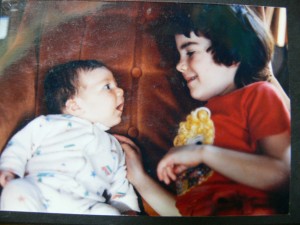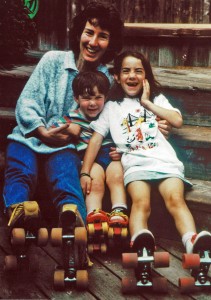|
|
June 17, 2011
 Maybe he's not so bad after all. Got email from a young dad who recently had a second baby. He and his wife were surprised at their 5 year old daughter’s reaction. “Emma clearly doesn’t like receiving less attention and has shown a change in behavior since the baby arrived. Thankfully she hasn’t taken it out on him, just directed it towards us.”
It was only 6 AM but Big Sister’s reaction was so familiar I skipped my starter cup of Earl Grey and immediately replied:
Hey Worried Dad,
If not classy, your daughter’s reaction is classic. During our son’s first 6 months, our daughter (also 5 at the time) was no ray of sunshine. Like your Emma, our girl never directed her resentment toward her brother, but she was obviously pissed at us… specifically me. Stands to reason. Five years she’s a mega star. Parents, grandparents, hell, even the UPS guys light up when they see her. She starts walking, talking and drawing pictures… OMG! Accolades pour in! That’s her life until… one day, Mom & Dad bring home a little blob in a blue blanket and bingo, Glory Days are gone.
From Child #1’s point of view, the arrival of #2 is the equivalent of Husband telling Wife, “Sweetie, I’d like to introduce you to my second wife. Isn’t she beautiful? And guess what? She’s going to live with us… FOREVER. I still love you, but you won’t be getting as much attention. We won’t be doing as much fun stuff together either. You see, my second wife has lots of needs so I’ll be focusing on her. When I’m with her, don’t interrupt us. If you do, I’ll probably get annoyed. I may even yell. Be quiet while she’s sleeping. And don’t bother me while I’m resting. Even though it looks like the coast is clear and I may be ready to spend time with you, I don’t have extra energy because it’s all going to… you guessed it, my second wife.
“What’s that? You’re not happy with these changes? You wanna know what you’re going to do about all this? I dunno. That’s your problem. Oh, one more thing… You must love my new wife as much as I do and share everything you’ve got with her. And don’t forget to smile. That’s very important. I want her to feel welcome.”
How would you feel if your one-and-only laid that on you?? OK, I see you’re starting to realize that Emma’s got a legitimate beef. Look, incorporating a new baby into the family isn’t an easy transition for any of you. Here are some suggestions that might help:
1) Acknowledge to Emma that her feelings of jealousy, resentment, etc. are TOTALLY VALID. Don’t make her feel like she’s “bad” if she’s not thrilled with the baby. While it’s OK for her to feel whatever’s she’s feeling, obviously it’s not OK for her to act out. Let her know that you guys get where she’s coming from then provide her with opportunities to express her feelings in responsible, appropriate and safe ways.
2) Dad, create special one-on-one time with your daughter. You and she deserve a weekly “date” outside the house, just the two of you. It will do wonders for your relationship and her behavior. Same with Mom and Emma. Insist they go off together once a week (at least for an hour or two) while you bond with your new son and give Mom a break.
3) Give Emma special “big sister” responsibilities. (No cleaning up or other yucky duties. Only the fun stuff!) Have her read to the baby. Sing to him. Draw pictures for his wall and let her explain the art to him. Show him how to play with his toys. Tell your daughter that her brother wants to get to know her. He’s curious about and impressed with all the things his Big Sister can do. He needs her to show him so much. Give her the opportunity to be one of his teachers and they will learn to love and appreciate each other.
It sure turned out that way with our little girl and her baby brother.

June 15, 2011
by Lisa Elifritz
One year ago this week, Lisa Elifritz lost her daughter, Amy Rae Elifritz, to Toxic Shock Syndrome. a rare but serious bacterial infection. In Amy’s memory, Lisa founded You ARE Loved, a non-profit organization committed to raising awareness about TSS. According to Larissa Hirsch, MD, TSS is a “very rare illness. Although it can be fatal, if recognized and treated promptly it is usually curable.” Thank you, Lisa, for doing your part in the areas of TSS awareness and prevention. Your beautiful daughter would be so proud of the work you’re doing.
 In loving memory of Amy Rae Elifritz (1989-2010) When my twenty year old daughter was hospitalized with flu-like symptoms, no one suspected Toxic Shock Syndrome (TSS), even though Amy was menstruating and had been using tampons. Unfortunately, she lost her life to TSS a few days later. In her memory, please take a few minutes to learn about Toxic Shock Syndrome and to share this information with your daughter, granddaughter or any t(w)een girl you love.
Symptoms of TSS
Only one or two symptoms may occur. They do not necessarily occur all at once and may not persist.
• Sore throat.
• Aching muscles
• High temperature (over 102F)
• Vomiting
• Headache
• Watery diarrhea
• Red rash
• Confusion
• Dizziness
• Very low blood pressure
What You Should Do
Quick action can save a life.
• Remove the tampon (save it if possible)
• Seek IMMEDIATE medical attention
• Inform the doctor that you have been using tampons
To Reduce the Risk of TSS
• Use the lowest tampon absorbency needed at each stage of your period and change tampons often
• Avoid using tampons continuously (alternate with sanitary pads, particularly at night)
• Use a pad or pantyliner at the end of your period instead of tampons
• Wash your hands before and after use (also handle the tampon as little as possible)
• Alert your family and friends to the symptoms and emergency action required
• Consider using other internal feminine hygiene options that don’t have the same risk of TSS (menstrual cups or tampons made of organic cotton)
According to the Center for Disease Control “In the United States, annual incidence of TSS is 1 to 2 women out of 100,000 women 15-44 years of age (last active surveillance done in 1987).”
TSS is a medical emergency. Part of prevention is communication. Young girls must discuss with their parent when they decide to use tampons. Someone else should know when tampons are used so that prompt action can be taken if the sufferer is unable to help herself.
If you or a young woman you know has been using tampons and/or intravaginal contraceptive devices (such as diaphragm and sponge) and experience flu-like symptoms and a fever, remove the tampon and go to the hospital immediately. Insist on getting blood work. If it is caught early enough and treated correctly, TSS is usually curable.

June 9, 2011
by Miranda Paul
Miranda Paul teaches both English and Spanish in Green Bay, Wisconsin. She holds a BA in English and Education from St. Mary’s College of Maryland where she helped launch a student-teacher exchange program in Gambia, West Africa. In her spare time, Miranda is a freelance writer for the University of Southern California’s Masters in Teaching online degree program.
When I began student teaching eight years ago, I didn’t belong to any social media sites. But in less than a year I learned an important lesson: Social media saves students. That first year I had one particularly challenging class among my 9th and 11th graders. The class was difficult because many students were too shy or intimidated to share their opinions. I did my best to encourage them, offering prizes for speaking up, etc., but by the end of my student teaching, only a handful of the most outgoing students had expressed how much they enjoyed my unit on poetry.
I felt I really hadn’t reached all of my students and that I had failed. Then one day, the following summer, I opened a heartfelt three-page email from a former student who rarely spoke in class. She described how, during the school year she had contemplated suicide, but poetry helped her through tough times. She was grateful for a handout I’d given in class, listing poetry forums where kids could post their words online. On those social media sites, she found friends and the confidence to discuss many issues. Her last line summed it up: Poetry saved her life and I had introduced her to poetry. That was powerful. A student who seemed afraid to talk in class wasn’t scared of publishing her words for all to see. Social media had saved a student’s life.
When I landed my first teaching position, I tried to include every technology available to me that would help me reach all of my students academically and developmentally. Student work was scanned and written about on blogs. Both parents and students had my e-mail address on the first day of school. By the next year, I had several students writing their own blogs. Several parents were skeptical – but others were enthusiastic about their child’s increased participation.
Social media is the new language of kids. If we want to reach them, we need to speak their language. But it’s equally important to make ourselves available on their platform so that they are able to reach us. Last week, I spoke to a group of 7th and 8th grade girls about some charity work I do in a small African country. After the presentation, the girls were eager to help with the project. “Are you on Twitter?” one girl asked, pulling out a phone, ready to type. The school day was technically over and parents were ready to leave, but the girls wanted to continue learning and social media would help them do it. I directed her to Facebook (I’m not yet on the Twitter bandwagon…). Because they had a way to reach me, within a few days, my charity more than doubled its Facebook fans.
I’m not the only teacher, student or parent who believes in the power of social media to connect and empower us all. Recent articles in The New York Times provide more convincing evidence of the growing educational and emotional power of social media. I loved reading about how Iowa English teacher Erin Olson used technology like Twitter to increase classroom discussion participation by more than 25%. In another story, retired history teacher Bill Chemerka discovered his impact on students when he found a Facebook fan page called the “Mr. Chemerka Fan Club,” with more than 450 members. Alye Pollack’s YouTube video is yet another example of how social media was the only way Alye felt confident enough to speak up about the issue of being bullied.
Based on my experiences and that of others, I’ll keep social media in mind as I prepare to teach summer courses (I’ve actually requested to teach one of my courses in a computer lab). Of course, as the traditional English teacher I am, I’ll also be bringing plenty of pencils and paper.

May 26, 2011
 Oh, what fun to be a mom! Every year on my birthday my daughter and son each write me a thoughtfully worded letter expressing how they feel having me as their mother. Touched I read their acknowledgement of what I’ve taught them and how I’ve shaped them. Of course I blubber through it all. They think I cry because their words are so beautiful and I’m a sucker for sentiment (both true). But mostly I weep over the Bigger Picture of one generation doing its best to raise the level of humanity through the next. I read my kids’ letters and see myself doing what I do because I’m a parent, and like all parents, it’s what I’m here for. The eternal dance is awesome. How can I not cry?
Mother’s Day, Father’s Day, graduations and weddings all offer opportunities to acknowledge parents. These messages of thanks are as important for children to articulate as they are for Mom and Dad to hear. But every relationship is a two-way street and we rarely hear expressions of gratitude flowing in the other direction. Which is why I want to take this time to thank my daughter and my son for some of the many things they’ve taught me.
My daughter has taught me that she is not me and that her way of doing things is not my way. Different doesn’t need fixing just because it’s different. From this lesson I’ve learned that other people have their own way of responding to the world. When I allow myself to be open-minded and respectful there is much I can learn from their ways. I can even change my way of doing things if someone else’s works better.
My son has taught me that it’s good sport and a great mental workout to explore all sides of an argument. From this I’ve learned that when you can understand someone else’s point of view well enough to take that side and advocate for it (even if you don’t necessarily agree with it) then you can learn some important things about the way others perceive the world… and how they perceive you!
My daughter has taught me that fun can be had in pretty much any situation. You just bring your imagination and your sense of play. From this I’ve learned you don’t need a reason to tweak the ordinary into the extraordinary or the outlandish. Weird is it’s own reward. If it amuses you and brings a smile, that’s reason enough. So why not?
My son has taught me that talking about people in unkind ways isn’t the best use of anyone’s time or intellect. It’s hurtful and habit-forming. From this I’ve learned to watch my mouth and remember that just because I’ve thought of something smart, sarcastic or clever doesn’t mean I need to say it.
My daughter has taught me that organizing your time and your life helps you do more of what you want. It also helps you feel good about what you’ve accomplished. From this I’ve learned that you don’t have to choose between being creative and being efficient. You can be efficiently creative. You can also be creative in your efficiency.
My son has taught me that listening is a skill worth developing. From this I’ve learned that most words are superficial. When you want people to take you seriously they’re more likely to do so when you listen more and talk less. Also when you do speak you should always come from a caring place.
My daughter has taught me that setting boundaries is a good thing. From this I’ve learned that telling other people what you need makes it more likely that you’ll get it. You’ll also find out sooner rather than later whether someone is willing and/or able to be the kind of friend you want. If not, lower your expectations and you won’t be disappointed.
My son has taught me that everyone deserves respect as does their time and their endeavors. From this I’ve learned that just because I’ve got something I want done now doesn’t mean that my desires are a top priority for everyone else. And so I’ve learned patience from this one too.
My daughter has taught me there is great satisfaction and sense of accomplishment from going outside your comfort zone physically and emotionally.
My son has taught me that staying calm is usually the first step to resolving an unexpected challenge.
My daughter has taught me that accesorizing is fun because if life is a stage then the body is a canvas.
My daughter and son have helped me realize that being their mom is truly an amazing honor. Like, the best. Thanks so much, guys. I am eternally grateful.
 — Older Posts »
| |















